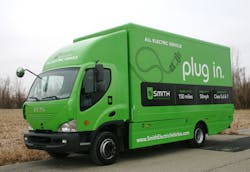Smith Electric Vehicles to form JV in Taiwan
Smith Electric Vehicles has signed a letter of intent to form a joint venture with Taikang Technology Corp. in Taiwan. The venture will produce 5,000 electric vehicles in the country over the next three years, Smith said.
Taikang has expertise in upfitting specialized municipal commercial vehicles, Smith said. The agreement covers assembly and distribution of all-electric vehicles in Taiwan. The vehicles will be Smith Electric branded.
The initial trucks will be Newton and Edison model vehicles configured for garbage pick-up and transport. Smith Electric will have the sole sourcing and procurement rights for its proprietary Smith Drive, Smith Power and Smith Link components under terms of the agreement. Taikang has been working closely with a number of Taiwanese government agencies on transforming its fleet of refuse trucks to all-electric.
"This is another significant milestone for Smith. With this letter of intent, we are eager to complete our first ever licensee agreement for the Company,” commented Bryan Hansel, CEO of Smith Electric. “Smith Electric plans more licensee agreements to support its long-term global growth strategy to meet growing demand for fleet transformation through electrification around the world.”
